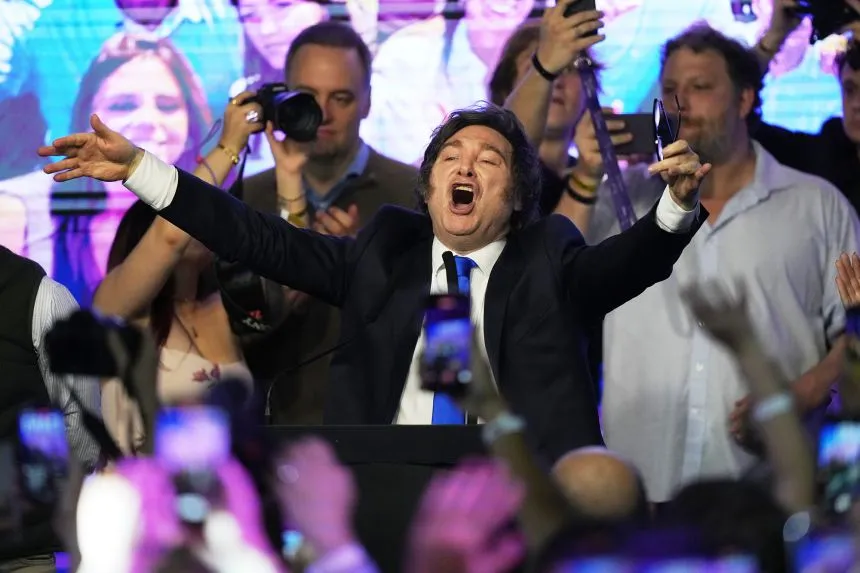Table of Contents
Last Sunday, Argentine president Javier Milei won a resounding victory in the country’s legislative elections. Despite fears of economic turmoil and falling poll numbers, Milei’s party “Liberty Advances” secured over 40% of the vote, well above the one-third threshold needed to prevent Congressional veto overrides, which would have marked the likely end of his rapid reforms. In response to the news, the primary Argentine stock index soared 22% on Monday, with the peso strengthening 4% against the dollar. Javier Milei’s latest triumph represents not only a rejection of the Peronist model but a mandate to continue his sweeping liberalization.
To understand Milei’s rise, one must first understand the decades of Peronist decay that preceded him. After the collapse of a brutal military junta in 1983 and the subsequent restoration of democracy, Argentina would be ruled by a center-left government before electing Carlos Menem in 1989. Despite his nominal affiliation with the Peronists, a uniquely Argentine populist, nationalist, and state corporatist movement, Menem would institute broadly successful neoliberal market reforms out of necessity due to Argentina’s collapsing economy. But along with them, he would continue to normalize and re-institutionalize cronyism, corruption, and graft in the Argentine economy and the Peronist movement until his departure from office in 1999.
For much of the next 25 years, Argentine politics would be dominated by the left-wing faction of Peronists under the leadership of President Nestor Kirchner and his wife and successor Cristina Fernández de Kirchner, notoriously supported by Hugo Chavez’s Venezuelan regime. While a liberal government would rule from 2015–2019, its market reforms would mostly be stifled by the entrenched Peronist opposition.
Under the Kirchners, Argentina entered a cycle of welfare expansion, fiscal deficits, and political clientelism that created structural weaknesses leading to economic decline. Peronist social policy in the form of subsidies and unaffordable pensions fueled a cycle of debt and market distortion. Unproductive government jobs masked unemployment while draining the treasury. Overregulation led to low growth, high inflation, and stifling currency and exchange rate controls. All the while, endemic corruption ingrained itself deeper into the bloated administrative structure of Argentina.
While the Argentine economy had experienced periodic issues due to global shocks and commodity cycles, it was on the brink of collapse post-Covid—according to the IMF, Argentina in 2023 had 42% poverty, 211% year-over-year inflation, a weak central bank balance sheet, significant public debt, and negative economic growth.
Enter Javier Milei. A macroeconomist turned politician, he ran for president during the 2023 election under the banner of his coalition Liberty Advances. The symbol of his movement became the chainsaw; he promised to fix Argentina’s issues by cutting the regulations, bureaucracy, and overspending of the Peronists. Milei’s insurgent campaign went on to win a handy (and stunning, to the political establishment) victory.
As an economist, Milei’s most urgent priority was inflation. He diagnosed chronic monetary indiscipline as the main culprit behind the issue and prescribed “shock therapy” by swiftly balancing the budget to reset expectations and achieve Argentina’s first surplus in 14 years. Overregulation was his next big target—Cato reports that since taking office he has consolidated over 10 ministries, cut 53,000 public jobs, and instituted over 1,200 deregulations. According to IMF projections, Argentina is on track for around 28% annual inflation in 2025, down from 2023’s figure of over 211%. With a freer economy, new businesses, cheaper goods, and future growth are possible, reflected in the return of Argentina’s once-dead mortgage market.
No doubt, Argentina’s transition has not been easy. Milei’s government has run into trouble with initially rising poverty rates, stagnant consumption, a glut of imports, continuing currency restriction troubles, and a host of internal critics. Legitimate concerns remain about the sustainability of such sweeping austerity, the risks of his more radical ambitions like dollarization, and severe credibility issues with the current monetary framework. But if temporary pain yields lasting growth, Argentina may finally escape the two-decade trap of Peronist stagnation. Voters have recognized Milei’s progress and renewed a mandate for reform. Fixing a broken, corrupt, stagnant socialist system is never easy—shock therapy requires a shock.
Milei’s victory is not only a win for Argentina but for America as well. His government is among the most openly pro-U.S. in South America and his win serves to signal that supporting America can be electorally and financially rewarded. Continuing to maintain strong relationships with one of the largest regional players could be invaluable to counter increasing Chinese influence and gain access to the country’s significant oil and mineral reserves.
Dollarization, one of Liberty Advances’ key campaign pledges, would provide an anchor to restore trust by integrating Argentina into the US monetary system. While not without costs and risks, the process appears potentially feasible given the Trump administration’s support, including a recently announced $20-40 billion package. But beyond geostrategic and economic motivations, Milei’s brand of libertarianism reflects a worldview kindred to the American one. As John F. Kennedy said in his first inaugural, “we shall pay any price, bear any burden, meet any hardship, support any friend, oppose any foe to assure the survival and the success of liberty.” And Milei is, above all, a champion of economic liberty.
With his reaffirmed mandate, Milei must continue to drive his country forward: strengthen his coalition, make reforms to labor laws, continue to rewrite tax policy, and facilitate long-term growth by lifting currency controls and ultimately pursuing dollarization. If he succeeds, Argentina’s experiment will stand as proof that even after decades of decay, liberty can still restore prosperity. His victory is not only for Argentina, but for the enduring cause of freedom in the world.





